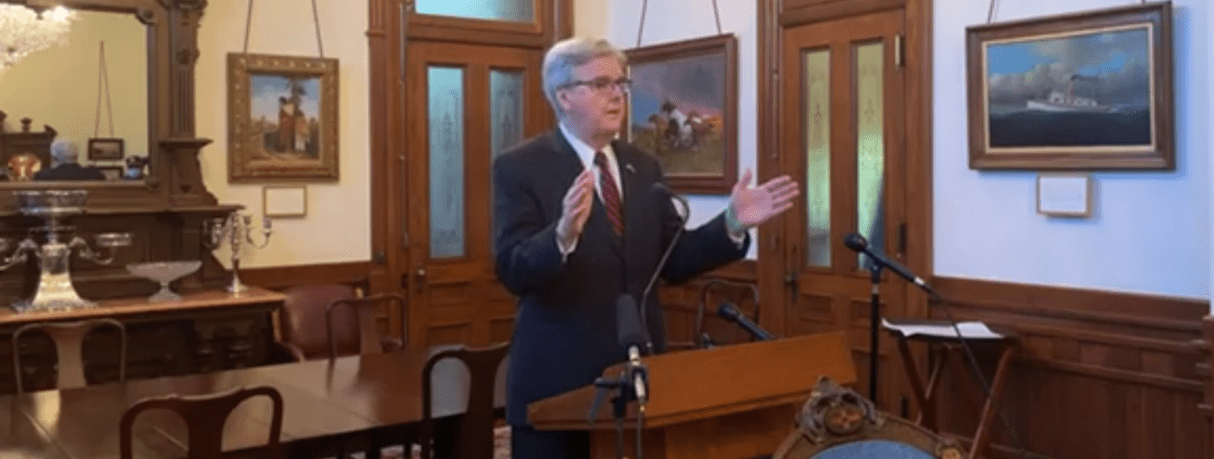On Wednesday, Texas Lt. Gov. Dan Patrick announced his priority legislation going into the third called special legislative session, which begins on Monday, September 20.
His listed priorities include providing for property tax relief, addressing the shortfall in the unemployment fund, youth sports protections, redistricting, and regulations on restraints for dogs.
Property Tax Relief
Patrick prioritized providing for property tax relief in the form of the same legislation that the Senate passed in the last few days of the second special session. If passed, it would provide an estimated savings of $100 on property tax bills for homes with taxable values of at least $300,000. It was never considered in the House of Representatives before the recent special session’s conclusion.
“Therefore, Senate Bill 1, by State Sen. Paul Bettencourt (R–Houston), identical to Senate Bill 91, which the Texas Senate passed in the Second Special Session by a vote of 29-2, sends a large amount of our surplus money back to taxpayers before spending on any new programs. This represents a quantum shift in the way we think about spending surplus dollars. Tax relief must come first – before new spending.”
In the regular legislative session that ended in May, the Legislature did not address property tax relief, even though Texans all across the state reported ever-increasing property tax burdens. Abbott added the issue to the first and second called special legislative sessions, but what ultimately passed only provided property tax relief for special classes of Texans, a far cry from what was needed to address the ever-increasing encumbrance on Texas property owners.
Notably, Texas House Speaker Dade Phelan did announce his support for the same legislation a few days after the conclusion of the recent special session in a tweet, where he contended that the Texas Legislature “moved the needle on property taxes in 2021” but that they have unfinished business in the upcoming special session. He went on to say, “Let’s provide REAL tax relief for Texas homeowners.”
The issue was not included on the agenda Abbott announced last week. Abbott can, however, add to his agenda at any time.
Federal Relief Appropriations Used for Unemployment Insurance Fund
Patrick also prioritized addressing the funding shortfall in the state’s Unemployment Insurance Fund.
“Senate Bill 2, by Sen. Jane Nelson (R–Flower Mound), will address funding for our unemployment insurance fund that was drained during 2020 due to COVID-19. Normally any shortfall in the unemployment fund is passed on to businesses through unemployment insurance taxes. We should help fund a major part of the multi-billion dollar shortfall since our unemployment payouts went up dramatically in 2020.”
Patrick stopped short of mentioning that since the Legislature did not address this issue in the previous special session, they now owe millions more to the U.S. Treasury, as interest has started to accrue on the $7 billion debt.
They will pay down this debt by appropriating some amount of the $16 billion allocated to Texas from the American Relief Plan Act, which can be used for such purposes. Allocating these funds was included on the agenda for the recently concluded special session, but not a single bill was filed to address it.
Youth Sports
Four times now, the Senate has passed legislation relating to prohibiting athletes from playing in UIL athletics that do not correspond with their biological sex at birth. After the recent special session concluded and the issue was left undone, Patrick very quickly requested that the governor add it to the next special session agenda. Abbott did.
“Senate Bill 3, the Fair Sports Bill, by Sen. Charles Perry (R–Lubbock), will once again address the unfairness of boys playing girls’ sports.”
This issue had its legislative prospects cut short during the regular session, causing leftist organizations like Quality Texas to celebrate its demise. The issue again fell victim to politics in the House as the recent special session concluded.
Redistricting
Due to delayed census data as a result of the COVID-19 pandemic, the decennial redistricting process was subsequently delayed. The issue has historically been one of the most tenuous between partisan lawmakers who participate in drawing their own legislative districts for the next decade, as well as districts for Texas congressional maps and the State Board of Education.
This cycle also marks the first time in more than 50 years that the Legislature will be drawing maps without additional federal scrutiny, known as “pre-clearance.”
Patrick said, “Senate Bill 4, by Sen. Joan Huffman (R–Houston), will be the new Senate district map.”
The Legislature has up to 30 days to consider and pass legislation providing for the new districts. In the recently concluded special session, they passed legislation to address a potential delay in candidate filing periods and primary election dates depending on when the redistricting maps get certified.
Dog Restraints
Surprising many conservative activists hoping to see the consideration of legislative priorities left undone, Abbott added the consideration of legislation relating to dog restraints, which he vetoed in the regular session. It was not an issue added to his agenda in the previous two special sessions.
“Senate Bill 5, by Sen. Eddie Lucio (D–Brownsville), will take care of man’s best friend – dogs – and keep them safe,” Patrick said.
What is Next?
The third called special legislative session begins Monday, September 20.
The session itself will involve the delayed and tenuous process of redistricting in the wake of what a bitter partisan stalemate between Republicans and Democrats (as a result of recent quorum breaks and the consideration of legislation relating to things like election integrity, social media censorship, critical race theory, and the restoration of funding for the Legislature).
It is unclear how, if at all, those previous issues will manifest in this special session.





